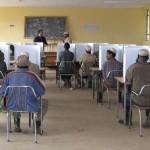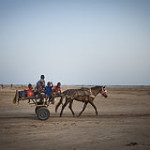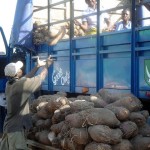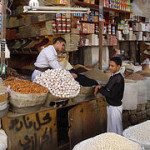Access to markets is challenging for smallholders who may not be able to compete with larger operations that can provide firms with consistent quantities of high-quality products. This barrier to entry may be due to the smallholders’ limitations to exploit economies of scale, but it can also be due to their apprehension to sign contracts. IFPRI’s research project, Contracting Out Poverty: Experimental Approaches to Innovation in Agricultural Markets with Small Farmers, explored three innovative contract structures to solve this problem, focusing on markets for high-value crops in three diverse locations: Peru, Tanzania, and Viet Nam. Using randomized trials, innovative contract designs were developed with private companies in each country (a mango producer in Peru and milk processors in Viet Nam and Tanzania).
Germany (Federal Ministry for Economic Cooperation and Development)
Germany prioritizes rural development and food security in its international development agenda. For almost two decades, the support of German partners—including the Federal Ministry for Economic Cooperation and Development (BMZ), Deutsche Gesellschaft für Internationale Zusammenarbeit (GIZ), several German universities such as the Center for Development Research (ZEF) at the University of Bonn, and the nongovernmental organization Welthungerhilfe—have been instrumental in IFPRI’s work in poverty alleviation, land degradation, climate change, improving health and nutrition, and developing and reporting on the Global Hunger Index. These partnerships continue to produce evidence-based research, driven by their aligned priorities to ensure sustainable food production and healthy food systems.
This brochure highlights some of the key research between IFPRI and Germany.
Strategies for Adapting to Climate Change in Rural Africa
The impact of climate change will be most severe in tropical countries, like many countries in Africa south of the Sahara—particularly in those that have scarce resources to channel into adaptation strategies, whose policy makers lack information, and where there is significant poverty. Even small climate changes can have a significant impact on farmers’ livelihoods and overall wellbeing. With support from the Federal Ministry for Economic Cooperation and Development (BMZ) and the CGIAR Research Program on Climate Change, Agriculture, and Food Security (CCAFS), IFPRI worked with the Association for Strengthening Agricultural Research in Eastern and Central Africa (ASARECA), the Food, Agriculture and Natural Resources Policy Analysis Network (FANRPAN), and other national partners to generate country-level analyses on climate change impacts and adaptation strategies for 10 countries in East Africa and 8 countries in southern Africa. IFPRI published the results in three books released in 2013: East African Agriculture and Climate Change: A Comprehensive Analysis, Southern African Agriculture and Climate Change: A Comprehensive Analysis, and West African Agriculture and Climate Change: A Comprehensive Analysis.
The Economics of Land Degradation
Land degradation is a serious threat to long-term food security. To resolve the paradox of growing land values in the face of continually low investment levels, research-based policy action is needed. With this in mind, IFPRI and the Center for Development Research at the University of Bonn (ZEF) researchers, with support from BMZ and later from the CGIAR Research Program on Policies, Institutions, and Markets (PIM), gathered and analyzed existing knowledge on land degradation as part of the Economics of Land Degradation initiative.
Pro-poor Growth and Investment in Lagging Rural Regions of Ghana and Viet Nam
The purpose of this line of research was to understand the role of agriculture in development, and how to achieve economic growth that benefits poor people in the most impoverished regions. To this end, and with support from BMZ and in partnership with the University of Hohenheim, IFPRI built regionalized economic models for Ghana and Viet Nam to evaluate the effectiveness of various development strategies. The work also involved training Ghanaian and Vietnamese collaborators on economy-wide modeling, and coordinating outreach and dissemination of results at the national and international levels.
Ensuring Yemen’s Food Security
In response to the 2007–2008 global food crisis, the Government of Yemen asked IFPRI to develop a National Food Security Strategy (NFSS). IFPRI, building on its previous work on food security in Yemen, provided technical support for the development of the strategy in close collaboration with the multi-ministerial Yemen Food Security Committee and with the support of GIZ, the European Union, and the World Bank. In addition, with support from GIZ’s "One World, No Hunger" Initiative, IFPRI continues to provide evidence-based solutions for tackling hunger in times of war through technical assistance, research and analysis, capacity building, and helping coordinate high-level policy workshops.
Strategic Investment Planning to Improve Growth and Reduce Poverty in Africa
In 2004, BMZ was one of the first organizations to partner with IFPRI in supporting the NEPAD Secretariat and the implementation of CAADP. BMZ’s partnership allowed IFPRI, between 2004 and 2007, to prepare a roadmap to guide the CAADP implementation process, establish the program’s credibility among development partners, and facilitate the adoption of the CAADP agenda by more than 20 African countries and by regional economic communities. From 2008 to 2011, IFPRI assisted the NEPAD Secretariat and regional economic communities in implementing and advocating for the CAADP agenda at the regional, sub-regional, and national levels. IFPRI also helped build the capacity of national teams and experts to lead the analytical work.
- 1
- 2
- 3
- 4
- Next Page »




